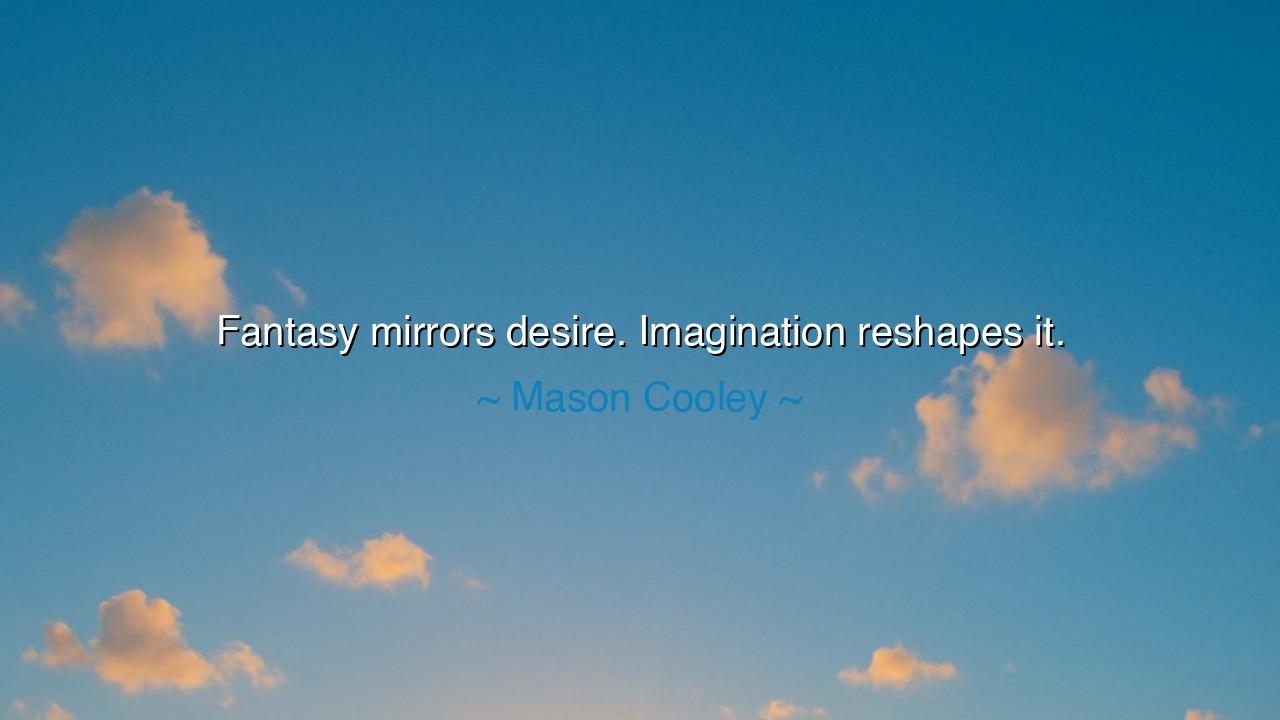
Fantasy mirrors desire. Imagination reshapes it.






“Fantasy mirrors desire. Imagination reshapes it.” Thus spoke Mason Cooley, a master of aphorism, who with few words unveiled the architecture of the human soul. His insight moves like a flame in the dark — gentle, luminous, and revealing. In this brief utterance, he divides the mind’s creative power into two sacred halves: fantasy, which reflects our desires, and imagination, which transforms them. Fantasy, he tells us, is the mirror in which our longing gazes at itself, while imagination is the alchemist that takes those longings and molds them into something higher, more enduring, more real.
The origin of this thought lies in the ancient understanding of the human mind as a divine instrument — both creative and dangerous. The poets of old, from Plato to Dante, spoke of the imagination as the bridge between heaven and earth. But they also knew of fantasy — the shadow form of imagination — which, if left ungoverned, becomes illusion. Cooley, in his modern wisdom, gives this dual truth new language. Fantasy shows us what we want; imagination shows us what we might become. The first is desire dreaming of pleasure; the second is desire dreaming of transformation.
When one gazes into the mirror of fantasy, one often sees only the self — the fulfillment of personal hunger, the world shaped to one’s comfort. It is beautiful, yet shallow, for it does not create; it only reflects. The imagination, however, takes that reflection and reshapes it into something new — it disciplines desire into vision, it refines passion into creation. The artist who dreams merely of fame lives in fantasy; the artist who dreams of expressing truth lives in imagination. Thus, imagination is not an escape from reality but a re-creation of it. It is the power by which humanity evolves.
Consider the story of Wright brothers, who began with fantasy but ended in imagination. In childhood, they gazed at birds and dreamed — as all dreamers do — of flight. That was fantasy, the desire to soar. But when they grew, they did not remain in the mirror of longing. They reshaped that fantasy through labor, intellect, and courage. They built, they failed, they learned — and by the strength of imagination, they brought to earth what was once only a symbol of freedom in the sky. Fantasy mirrors desire; imagination reshapes it into wings.
In every life, this pattern repeats. The lover imagines perfect happiness and finds instead the truth of devotion. The thinker dreams of knowledge and discovers humility. The reformer imagines a perfect world, but through struggle, learns that perfection lies not in conquest, but in compassion. Imagination refines desire through reality, turning it from self-seeking into self-creating. The wise learn that fantasy is a spark — necessary, but fleeting — while imagination is the fire that warms generations.
And yet, we must not despise fantasy, for it is the beginning of vision. Without desire, there is no movement; without fantasy, there is no dream to refine. But fantasy must be tested, shaped, and forged by imagination, lest it remain only reflection and never revelation. The ancients called this balance the union of Eros and Logos — passion and reason, longing and order. Together, they create the beauty of human progress. Alone, either can destroy.
So, dear soul, take this teaching into your life: let fantasy awaken your heart, but let imagination guide your hands. When you dream, do not stop at pleasure — dream toward purpose. When you desire, do not merely crave — create. The fantasies that mirror your longings are not lies; they are beginnings. But imagination is the sacred force that can shape those beginnings into truth. As Cooley reminds us, to live as mere dreamers is to be trapped by reflection, but to live as creators is to walk with the gods — reshaping desire into destiny, and longing into light.






AAdministratorAdministrator
Welcome, honored guests. Please leave a comment, we will respond soon